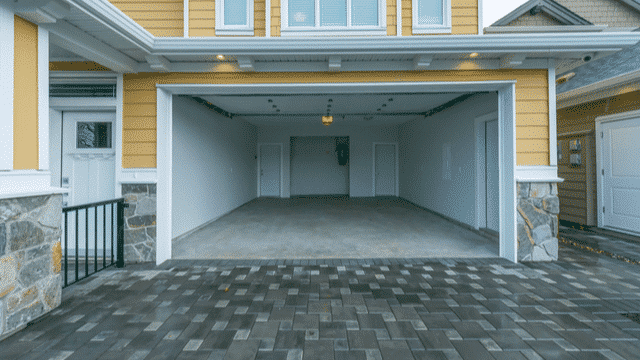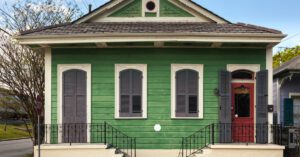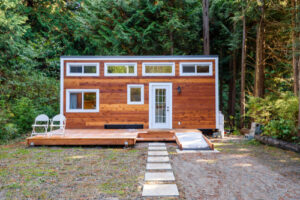If you’re house shopping and have a list of must-haves, does a garage make the list? Depending on your wants and needs, you may prioritize a garage over other features of a home. This is something your Guelph real estate agents can help you with!
In this weeks blog, we’ll look at the pros and cons of a garage, both functional and financial.
What’s the point of a garage?
In older neighbourhoods and homes, garages were originally used as stables for horses. As technology advanced, the need for stables decreased and cars were put into garages. Since then a garage has been a staple of many North American homes.
For many homebuyers, a garage is a necessity. If you own a vehicle, it will offer safety and convenience, as well as extra storage space. For other homeowners, they have different values and don’t add value to a garage- perhaps they value a larger yard or home instead.
What are the benefits of a garage?
Many people believe the pros outweigh the cons of a garage. Here are some pros to consider:
Protect Your Car from the Weather
The main use of a garage is to store your car in it. Depending on your climate, this could be a huge benefit. For those living in snowy climates, you’ll know the value of not having to scrape off an icy car in arctic temperatures!
For those in warmer climates, keeping your car inside keeps your car cool (hot leather seats are not fun!) and out of the sun to prevent fading of interior and exterior.
Anyone who has a classic car (Ryan!) or motorcycle will likely see the benefit of a garage in the winter months while they store their vehicle to prevent rust from road salt and slush.
Accessibility & Convenience
Most garages have access to the house from inside. This was the standard from the 1950’s onwards as garages became more common. This accessibility lead to home layouts that benefited from the function of such access. Mainly, this included a kitchen located just inside the garage. This allowed for someone to pull their car into the garage and unload groceries into the kitchen with ease.
Safety & Security
By having your car in a garage with a closed door, you encapsulate it and avoid external elements such as falling branches, inclimate weather events and more.
You also prevent car thefts and break ins by not having your car accessible to the public. In fact, you may even get an insurance reduction by having your car stored inside.
Preservation of Curb Appeal
Although this can be subjective, some would say that a neighbourhood looks better if a car is in a garage. Of course, there is no by-law about people being required to do this (that we know of, anyways!). However, for those who are home mechanics or have multiple cars, storing them inside is a benefit.
Instead of doing mechanic repairs on the driveway which may be unsightly, these can be done in a garage and the door can be closed. In fact, if you live in a townhouse, they may have a bylaw about driveway repairs to a car.
You’ll Have Increased Storage Space
Despite a garage having an original use as storage for a car, many homeowners don’t even use these for cars! Many people use the space for storage for many different things including snow tires, lawnmowers, seasonal decorations, tools and much more. In fact, when selling a house our clients will often put all their things in there while home staging!
Limitations
Likely to be in a newer neighbourhood
Many older homes were built before cars! This means they likely didn’t have a stable for their horse and you don’t have a garage. Or, your home was built during an era where people didn’t have excess funds for such luxuries. This is particularly true in post WWII (homes built in the 1940’s to mid 1950’s). So, if you love the charm of older homes but have a number one priority of a garage, you may be out of luck. If you have the space, you may be able to build one if your city by-laws permit it.
Less social
One thing that our clients typically don’t consider is that having a garage (especially with an entrance to your house) can be less social. Think about it from a practical perspective. You drive up to your house, press a button to open the garage door. Then you drive in and the door shuts behind you. You go into your house.
Doesn’t seem anti-social, does it? Well, if you do it every day, you literally have no exposure to your neighbours. In the old days without a garage, you would park in your driveway and have a chance to interact with your neighbours- that whole step is missing now!
What’s the value of a garage for re-sale?
While it’s difficult to put a direct monetary amount on how this feature affects home value, the short answer is yes. Like curb appeal landscaping, a garage definitely increases market desirability. Rarely are we in a situation where a client refuses to buy a house without one though. It may be more that the clients want a bigger yard- that could be achieved if a garage wasn’t there.
Recent research found a garage can add as much as 5-10 percent of the price of a typical home. If you have the space on your lot, it may be a wise move to build one. This way, you benefit from it while you live there as well as when you eventually sell.
Types of garage
This may seem like a simple question, but there are a few formats worth considering that have different impacts on re-sale.
Attached
This is when the garage is literally attached to the rest of the house. This can either be from the original design, or added as an addition after the house is already built. Attached garages became popular in the 1950’s with the post-war bungalow detached home.
A key factor here is having access to the interior of the house from the garage. Although it’s almost always the case, we’ve seen houses that add a garage after the house is built and don’t have access to the house. Sometimes, there is another door at the back that leads to the backyard.
A single car garage is the most common, although starting in the 1980’s double car became more popular. Although they do exist, triple car or larger are usually only found in luxury homes.
Sometimes, attached garages have living spaces above them. These are most likely bedrooms. One word of advice here is to ask about insulation, as it can make a room colder in winter if not insulated.
Detached garage
You’re more likely to see a detached variation in homes in older areas, as this was something used for horse and buggies prior to cars. Even after cars were built, rarely did a house have an attached option. Detached garages are generally common in homes that were built pre-1950, like most bungalows for sale in Guelph.
Over time, as cars change detached garages are being less for car storage. Instead, you can find them being used for storage (like a shed would be used) or even as a secondary hangout space that became common during COVID (see below for some trending uses).
In our case, we had Guelph electricians come to the house and wire it. Of course, these originally didn’t have wiring so it can be expensive to retrofit electricity in.
Carport
Carports had their era in the 1960’s through early 1980’s. It’s rare to see a home built today with a carport. Carports are permanent structures like a garage, but without front and back doors. It’s basically a permanent, open air canopy over your car.
Carports are good for those people who like the benefits of a garage, but like the fact that it’s still outdoors and not enclosed. The benefit of added light and a breeze made these popular. Obviously, during winter many people would prefer an enclosed area.
Portable or seasonal
The perfect option for the homeowner who needs to protect their car or outdoor equipment but doesn’t want to fully commit to a permanent garage. This option will protect you from bad weather and then disappear in summer months. Depending on where you live, you may not be allowed to use one of these.
Portable options are quick to install, easy to hose off and scrub when necessary, and strong enough to last due to their bolted-together brackets and triple-layer woven fabric covers. It’s important that you talk to your local permit office to ensure you know the rules of these structures. It’s like a tent for your garage or other belongings.
How much does it cost to build a garage?
There are a number of factors to consider when building a garage including materials, foundation, location and size. Assuming you are building a detached garage, you can estimate roughly $50 per square foot. A single car garage could cost $15,000-$20,000, a double car would be $25,000- $30,000. Whether you insulate or add other features could impact the price.
Is a house without a garage a good investment?
For many homebuyers, a garage is a must have. If you own a vehicle, this space offers safety and convenience, as well as extra storage space. Even if you don’t need the space, you could decide to sell your home in the future and benefit from the re-sale value.
However, even before you get to this decision, you likely have an idea of the type of home you want to live in. This decision could guide you down the path of whether a garage is right for you. If you like older homes, you may choose the charm and character as a priority. If you like newer homes or considering a pre-construction home, you’re almost guaranteed to have a garage.
Trending uses for a garage
As mentioned above, with COVID many people re-imagined how they were going to live their lives. In many cases, people took on new careers, hobbies and workplace arrangements. Here in Guelph, it was very common to see folks from area code 437, 416 and 905 move here. This is because their employer gave them the opportunity to work remotely more often.
Homeowners are coming up with new and creative uses for their garage spaces. In fact, many are in search of designers and architects to help them transform their dull, stale garages into something new and better. Rather than just using the space for storage of cars, tools and junk, homeowners are creating family fun areas.
Here are five trends that are shaping how people use their garage space:
Home gym
Games room
TV room
Home office
Craft/ art/ hobby studio
Conclusion
In Southern Ontario, housing is in short supply. Although a home with a garage may fetch a premium, it’s likely not a deal breaker for many.
Before making any decision on buying a home with a garage or without, talk to your Guelph realtors



